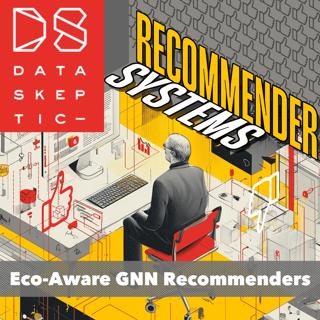![[MINI] The Accuracy Paradox](https://cdn.podme.com/podcast-images/A7F0EB2B1F29D8BEF411807AC648CB64_small.jpg)
[MINI] The Accuracy Paradox
Today's episode discusses the accuracy paradox. There are cases when one might prefer a less accurate model because it yields more predictive power or better captures the underlying causal factors describing the outcome variable you are interested in. This is especially relevant in machine learning when trying to predict rare events. We discuss how the accuracy paradox might apply if you were trying to predict the likelihood a person was a bird owner.
27 Marras 201517min

Neuroscience from a Data Scientist's Perspective
... or should this have been called data science from a neuroscientist's perspective? Either way, I'm sure you'll enjoy this discussion with Laurie Skelly. Laurie earned a PhD in Integrative Neuroscience from the Department of Psychology at the University of Chicago. In her life as a social neuroscientist, using fMRI to study the neural processes behind empathy and psychopathy, she learned the ropes of zooming in and out between the macroscopic and the microscopic -- how millions of data points come together to tell us something meaningful about human nature. She's currently at Metis Data Science, an organization that helps people learn the skills of data science to transition in industry. In this episode, we discuss fMRI technology, Laurie's research studying empathy and psychopathy, as well as the skills and tools used in common between neuroscientists and data scientists. For listeners interested in more on this subject, Laurie recommended the blogs Neuroskeptic, Neurocritic, and Neuroecology. We conclude the episode with a mention of the upcoming Metis Data Science San Francisco cohort which Laurie will be teaching. If anyone is interested in applying to participate, they can do so here.
20 Marras 201540min
![[MINI] Bias Variance Tradeoff](https://cdn.podme.com/podcast-images/203F36C9320DDD8535D9D5291D2B6EAB_small.jpg)
[MINI] Bias Variance Tradeoff
A discussion of the expected number of cars at a stoplight frames today's discussion of the bias variance tradeoff. The central ideal of this concept relates to model complexity. A very simple model will likely generalize well from training to testing data, but will have a very high variance since it's simplicity can prevent it from capturing the relationship between the covariates and the output. As a model grows more and more complex, it may capture more of the underlying data but the risk that it overfits the training data and therefore does not generalize (is biased) increases. The tradeoff between minimizing variance and minimizing bias is an ongoing challenge for data scientists, and an important discussion for skeptics around how much we should trust models.
13 Marras 201513min

Big Data Doesn't Exist
The recent opinion piece Big Data Doesn't Exist on Tech Crunch by Slater Victoroff is an interesting discussion about the usefulness of data both big and small. Slater joins me this episode to discuss and expand on this discussion. Slater Victoroff is CEO of indico Data Solutions, a company whose services turn raw text and image data into human insight. He, and his co-founders, studied at Olin College of Engineering where indico was born. indico was then accepted into the "Techstars Accelarator Program" in the Fall of 2014 and went on to raise $3M in seed funding. His recent essay "Big Data Doesn't Exist" received a lot of traction on TechCrunch, and I have invited Slater to join me today to discuss his perspective and touch on a few topics in the machine learning space as well.
6 Marras 201532min
![[MINI] Covariance and Correlation](https://cdn.podme.com/podcast-images/E01C2F2678EA86170A7D1A4FECF598D6_small.jpg)
[MINI] Covariance and Correlation
The degree to which two variables change together can be calculated in the form of their covariance. This value can be normalized to the correlation coefficient, which has the advantage of transforming it to a unitless measure strictly bounded between -1 and 1. This episode discusses how we arrive at these values and why they are important.
30 Loka 201514min

Bayesian A/B Testing
Today's guest is Cameron Davidson-Pilon. Cameron has a masters degree in quantitative finance from the University of Waterloo. Think of it as statistics on stock markets. For the last two years he's been the team lead of data science at Shopify. He's the founder of dataoragami.net which produces screencasts teaching methods and techniques of applied data science. He's also the author of the just released in print book Bayesian Methods for Hackers: Probabilistic Programming and Bayesian Inference, which you can also get in a digital form. This episode focuses on the topic of Bayesian A/B Testing which spans just one chapter of the book. Related to today's discussion is the Data Origami post The class imbalance problem in A/B testing. Lastly, Data Skeptic will be giving away a copy of the print version of the book to one lucky listener who has a US based delivery address. To participate, you'll need to write a review of any site, book, course, or podcast of your choice on datasciguide.com. After it goes live, tweet a link to it with the hashtag #WinDSBook to be given an entry in the contest. This contest will end November 20th, 2015, at which time I'll draw a single randomized winner and contact them for delivery details via direct message on Twitter.
23 Loka 201530min
![[MINI] The Central Limit Theorem](https://cdn.podme.com/podcast-images/39CE4C1084BA89754E89BD97339A2320_small.jpg)
[MINI] The Central Limit Theorem
The central limit theorem is an important statistical result which states that typically, the mean of a large enough set of independent trials is approximately normally distributed. This episode explores how this might be used to determine if an amazon parrot like Yoshi produces or or less waste than an African Grey, under the assumption that the individual distributions are not normal.
16 Loka 201513min

Accessible Technology
Today's guest is Chris Hofstader (@gonz_blinko), an accessibility researcher and advocate, as well as an activist for causes such as improving access to information for blind and vision impaired people. His background in computer programming enabled him to be the leader of JAWS, a Windows program that allowed people with a visual impairment to read their screen either through text-to-speech or a refreshable braille display. He's the Managing Member of 3 Mouse Technology. He's also a frequent blogger primarily at chrishofstader.com. For web developers and site owners, Chris recommends two tools to help test for accessibility issues: tenon.io and dqtech.co. A guest post from Chris appeared on the Skepchick blogged titled Skepticism and Disability which lead to the formation of the sister site Skeptibility. In a discussion of skepticism and favorite podcasts, Chris mentioned a number of great shows, most notably The Pod Delusion to which he was a contributor. Additionally, Chris has also appeared on The Atheist Nomads. Lastly, a shout out from Chris to musician Shelley Segal whom he hosted just before the date of recording of this episode. Her music can be found on her site or via bandcamp.
9 Loka 201538min



















